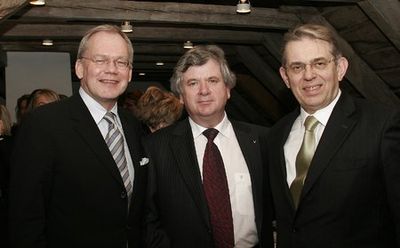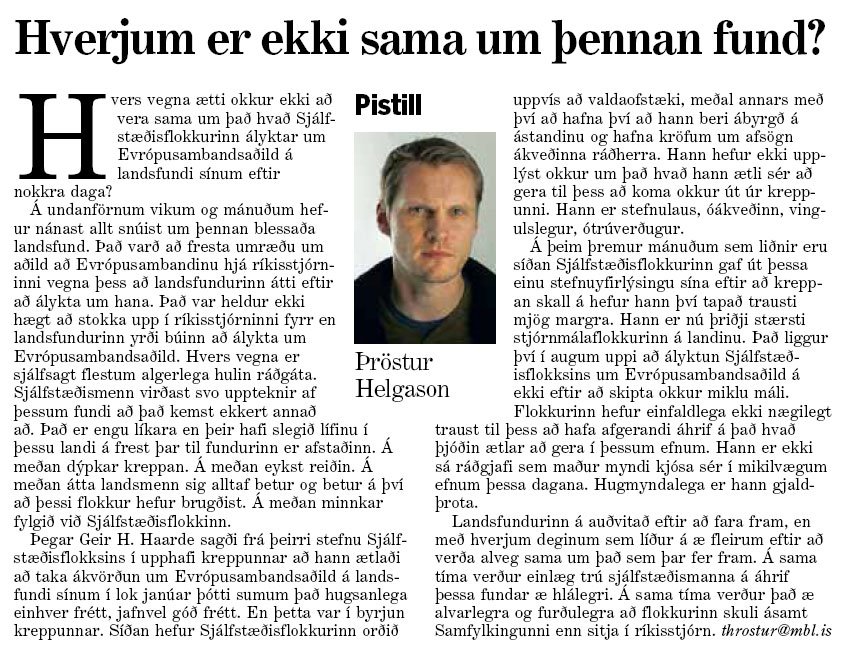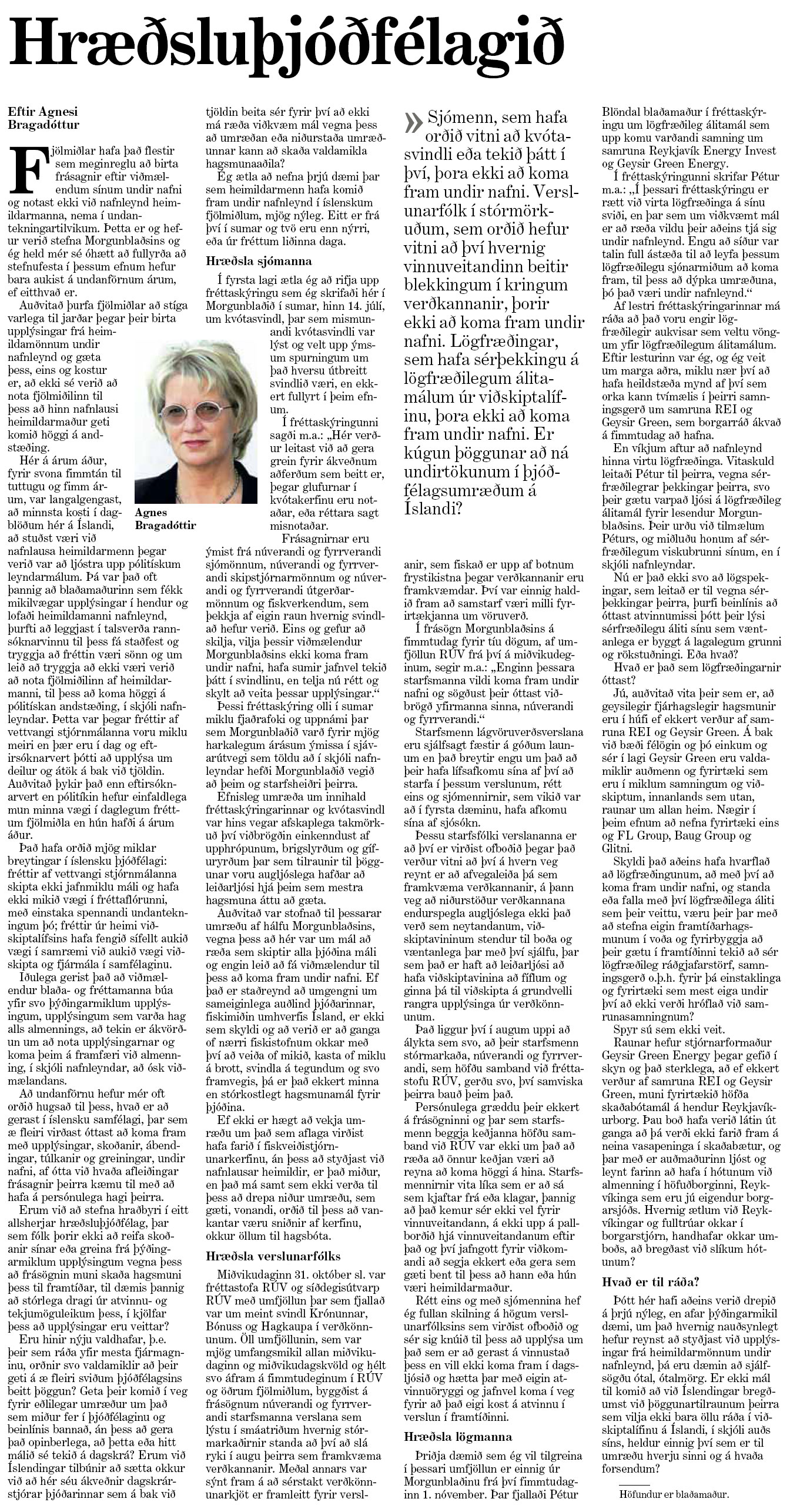73. grein stjˇrnarskrßr Lřveldisins ═slands hljˇar svo: "Allir eru frjßlsir skoana sinna og sannfŠringar. Hver maur ß rÚtt ß a lßta Ý ljˇs hugsanir sÝnar, en ßbyrgjast verur hann ■Šr fyrir dˇmi. Ritskoun og arar sambŠrilegar tßlmanir ß tjßningarfrelsi mß aldrei Ý l÷g leia. Tjßningarfrelsi mß aeins setja skorur me l÷gum Ý ■ßgu allsherjarreglu ea ÷ryggis rÝkisins, til verndar heilsu ea sigŠi manna ea vegna rÚttinda ea mannors annarra, enda teljist ■Šr nausynlegar og samrřmist lřrŠishefum."
Flott - allir frjßlsir skoana sinna og sannfŠringar og eiga rÚtt ß a lßta Ý ljˇs hugsanir sÝnar. Enga ritskoun ea tßlmanir ß tjßningarfrelsi. GlŠsilegt - svona er ═sland... ea hva? Nei.
Ekki aldeilis. Okkur eru vŠntanlega flestum Ý fersku minni řmsar uppßkomur Ý gegnum tÝina ■ar sem fˇlk hefur veri lßti gjalda ora sinna og skoana sem voru ekki stjˇrnv÷ldum ea vinnuveitendum ■eirra ■ˇknanlegar. Ůessi skoanak˙gun hefur valdi ˇtr˙legri hrŠslu Ý ■jˇfÚlaginu og ˇtta margra vi a tjß sig og segja sannleikann um řmis mßlefni. Fˇlk ■arf a ˇttast atvinnumissi, faglegan rˇg og fleira miur skemmtilegt ef ■a fylgir sannfŠringu sinni. Geslegt ■jˇfÚlag? Nei.
LÝka ß Al■ingi ═slendinga. Vi vitum mŠtavel a margir ■ingmenn greia atkvŠi gegn sannfŠringu sinni ■ˇtt 48. grein stjˇrnarskrßrinnar hljˇi svo: "Al■ingismenn eru eing÷ngu bundnir vi sannfŠringu sÝna og eigi vi neinar reglur frß kjˇsendum sÝnum." Ůeir virast Ši oft vera tr˙rri flokknum en sannfŠringu sinni ea fˇlkinu Ý landinu. ŮvÝ ef ■ingmaur greiir atkvŠi gegn vilja flokksins eru til řmis rß til a gera ■ingmanninn "skalausan" og ■ar me ßhrifalausan me ÷llu. Vi h÷fum fordŠmi fyrir ■essu ß Al■ingi. Viring fyrir sannfŠringu al■ingismanna? Nei.
Gumundur Gunnarsson, verkalřsforingi, minnist ß ILO 58 regluna Ý ■essari bloggfŠrslu. ILO stendur fyrir International Labour Organization ea Al■jˇaatvinnumßlastofnunina. Reglan sem Gumundur vitnar til gengur ˙t ß a atvinnurekandi veri a tilgreina ßstŠu fyrir upps÷gn starfsmanns. Gumundur segir a flestar Evrˇpu■jˇir og margar ■jˇir AsÝu hafi stafest ■essa reglu - en ekki ═sland. HÚr mß reka fˇlk ˙r vinnu og svipta ■a lÝfsviurvŠrinu eftir ge■ˇtta yfirmanna, m.a. ef ■eim lÝkar ekki vi skoanir starfsmannsins. Skoana- og tjßningarfrelsi? Nei.
Halldˇr Kristinn Bj÷rnsson, bifvÚlavirki hjß Toyota og virkur andˇfsmaur, skrifai bloggfŠrslu og var rekinn ˙r vinnunni. BloggfŠrslan ˇgurlega er hÚr. "Skortur ß viringu gagnvart samstarfsm÷nnum og vilja til samstarfs."
Ůr÷stur Helgason, blaamaur ß Morgunblainu og ritstjˇri Lesbˇkar, skrifai meal annars ■ennan pistil um mijan jan˙ar og var rekinn um sÝustu mßnaamˇt. "Skipulagsbreytingar."
Halla Gunnarsdˇttir, blaamaur ß Morgunblainu og ■ingfrÚttamaur ■ess, tˇk virkan ■ßtt Ý Borgarafundunum, hÚlt rŠu ß einum ■eirra og talai fyrir ■eim. H˙n var lÝka rekin um sÝustu mßnaamˇt. "Skipulagsbreytingar."
Mßlfrelsi? Skoanafrelsi? Tjßningarfrelsi? Hverjir rßa ■arna f÷r og hvaa hvatir liggja a baki? Hver hefur hag af ■vÝ a hÚr rÝki ßfram ˇtti vi a tjß skoanir sÝnar? Margir sem fjalla um vikvŠm mßl, einkum ■au sem snerta pˇlitÝk og aumyndun einhvers konar, hafa fundi Ýtreka fyrir hrŠslu fˇlks vi a tjß sig opinberlega - meira a segja Úg.
Ëmar Ragnarsson hefur fundi harkalega fyrir ■essari ˇgnun og fj÷lmargir vÝsindamenn, svo dŠmi sÚ teki, hafa ekki ■ora a stÝga fram me upplřsingar t.d. hva varar jargufuvirkjanir og ˇtalmargt fleira sem kŠmi sÚr illa fyrir rÝkjandi yfirv÷ld ea vinnuveitendur ■eirra. Sjßlf hef Úg fengi fj÷lm÷rg ummŠli, bŠi Ý sÝma og t÷lvupˇsti, ■ar sem mÚr er ■akka og hrˇsa fyrir a hafa kjark og ■or til a skrifa ■a sem Úg skrifa og birta ■a sem Úg birti. ١ er Úg aeins a segja skoanir mÝnar og ■a sem Úg tel sannleika - og Úg er n˙ bara pÝnulÝti pe Ý samfÚlagi mannanna.
Agnes Bragadˇttir, blaamaur, skrifai athyglisvera grein um ■etta Ý nˇvember 2007 sem h˙n kallai HrŠslu■jˇfÚlagi (smelli ■ar til lŠsileg stŠr fŠst). Viljum vi a ■jˇfÚlag framtÝarinnar veri ßfram hrŠslu■jˇfÚlag? Ekki Úg.
Bloggar | Breytt 6.2.2009 kl. 02:10 | Slˇ | Facebook | Athugasemdir (30)
5.2.2009
Bankakreppan - hlutverk fj÷lmila
Eins og kom fram hÚr voru fulltr˙ar fj÷gurra breskra fj÷lmila spurir spj÷runum ˙r af rannsˇknarnefnd breska ■ingsins daginn eftir a Tony Shearer tjßi sig um Kaup■ing. Umfj÷llunarefni var hlutverk og ßbyrgá fj÷lmila Ý bankakreppunni. MŠttir voru fulltr˙ar frß Financial Times, Daily Mail, Guardian og BBC. Ůetta er frˇleg umrŠa og h˙morinn jafnvel aldrei langt undan, enda Bretar frŠgir fyrir skopskyn sitt.
Bankakreppan - hlutverk fj÷lmila - 1. hluti
á
Bankakreppan - hlutverk fj÷lmila - 2. hluti
á
Bankakreppan - hlutverk fj÷lmila - 3. hluti
á
Bloggar | Slˇ | Facebook | Athugasemdir (4)
═sland er undir smßsjß erlendra fj÷lmila ■essar vikurnar og mßnuina vegna efnahagshrunsins. Vi erum sřnishorn af gjald■rota ■jˇ ■ar sem regluverki utanum banka og fjßrmßl var ekkert, grŠgi ÷rfßrra manna, kunningja- og klÝkusamfÚlag auk ÷fgafullra, pˇlitÝskra tr˙arbraga og  vanhŠfni stjˇrnmßlamanna og rßgjafa ■eirra leiddi ■jˇina Ý ■rot. N˙ veina arkitektar og verktakar hrunsins eins og stungnir grÝsir ef ■eir eru gagnrřndir ea missa mj˙ku stˇlana sem ■eim lei svo undurvel Ý. Enginn ■eirra hefur enn haft kjark til a horfast Ý augu vi eigin ■ßtt Ý hruninu, eigin s÷k ß ßstandinu, ■ˇtt sannanirnar glenni sig framan Ý ■ß dag eftir dag, viku eftir viku. Og enginn hefur bei ■jˇina afs÷kunar.
vanhŠfni stjˇrnmßlamanna og rßgjafa ■eirra leiddi ■jˇina Ý ■rot. N˙ veina arkitektar og verktakar hrunsins eins og stungnir grÝsir ef ■eir eru gagnrřndir ea missa mj˙ku stˇlana sem ■eim lei svo undurvel Ý. Enginn ■eirra hefur enn haft kjark til a horfast Ý augu vi eigin ■ßtt Ý hruninu, eigin s÷k ß ßstandinu, ■ˇtt sannanirnar glenni sig framan Ý ■ß dag eftir dag, viku eftir viku. Og enginn hefur bei ■jˇina afs÷kunar.
Einn hinna stungnu, veinandi grÝsa er Hannes Hˇlmsteinn Gissurarson, prˇfessor og bankarßsmaur Ý Selabankanum. Honum tˇkst einhvern veginn a sleppa vi ßminningu eftir h÷fundarrÚttardˇminn en n˙ lÝtur ˙t fyrir a hann missi ■Šgilegan og vel launaan bitling Ý Selabankanum ■ar sem hann hefur seti um ßrabil sem besti vinur Aal.
Hannes Hˇlmsteinn hefur ekki haft sig miki frammi upp ß sÝkasti eftir a tr˙arbr÷g hans, frjßlshyggjan, sigldu Ý strand me lßtum. En n˙ skrifai Hannes Hˇlmsteinn grein. Ekki Ý Ýslenskt dagbla ■vÝ hann veit a enginn hlustar ß hann lengur ß ═slandi. Hann skrifai grein Ý Wall Street Journal og fer mikinn. Ver besta vininn me kjafti og klˇm - og sjßlfan sig Ý leiinni - og fer afskaplega frjßlslega me s÷gu og stareyndir. Lßti ykkur ekki brega vi fyrirs÷gnina og komm˙nistakjaftŠi. Hannes Hˇlmsteinn veit sem er, a enn mß ekki nefna komm˙nisma ß nafn Ý BandarÝkjunum. McCarthyisminn er lÝfsseigur. Lesum grein Hannesar Hˇlmsteins.
FEBRUARY 2, 2009, 6:31 P.M. ET
Iceland Turns Hard Left
By HANNES H. GISSURARSON
Reykjavik, Iceland
May you live in interesting times, says an ancient Chinese curse which has now hit Iceland.
All three of Iceland's commercial banks collapsed in the beginning of October. In exchange for a $5.1 billion rescue package, the International Monetary Fund (and the European Union) forced Iceland's government to assume the banks' commitments for foreign depositors. Thus was created one of the largest public debts per capita: possibly about $10 billion for a nation of 310,000, or more than $30,000 per head.
Street riots, hitherto unheard of in this peaceful country, have now brought down the government. Rattled by protests in front of the parliament, the  Social Democrats, the junior partner in a coalition with the conservatives, last week insisted that the government resign.
Social Democrats, the junior partner in a coalition with the conservatives, last week insisted that the government resign.
Besides this turmoil, both coalition leaders, conservative Prime Minister Geir H. Haarde and Social Democratic Foreign Minister Ingibjorg S. Gisladottir, were diagnosed with tumors, in Mr. Haarde's case a malignant one. Remaining calm throughout the whole episode, even when physically threatened by rioters, Mr. Haarde announced on Jan. 23 that he is retiring from politics.
On Sunday a new minority government took over, led by the Social Democrats and the Left Greens, the unrepentant heirs to the Icelandic Communist Party. The main task of the new government, led by Social Democratic Prime Minister Johanna Sigurdardottir, will be to dissolve parliament and prepare for new elections in April.
An old-fashioned Social Democrat of the Swedish ilk, with little sympathy for the business community, Ms. Sigurdardottir is seen as untainted by Iceland's financial debacle. The same applies to the Left Greens, who opposed the bank privatizations of the late 1990s. Polls suggest that the Left Greens will make huge gains in the elections and possibly become the biggest political party, thus enabling the new government to continue in power.
Its first act will be one of political vengeance: Ms. Sigurdardottir said at a press conference on the day she took office that she will try to dismiss David Oddsson, the governor of the Central Bank, who dominated Icelandic politics as conservative prime minister from 1991 to 2004.
With his sharp wit and forceful personality, Mr. Oddsson made enemies not only on the left, but also among some of Iceland's "tycoons."
In 2004, at the close of his tenure, there was a bitter conflict between him and Iceland's best-known tycoon, Jon Asgeir Johannesson, the main owner of Baugur Group, which controls more than 75% of the private media in Iceland. Worried about so much power in the hands of one man, Mr. Oddsson pushed for legislation that would have have barred any market-dominant firm from controlling more than 25% of any media company.
Although parliament passed the law, President Olafur R. Grimsson, who has close ties to Mr. Johannesson, refused to sign it. Needless to say, Mr. Johannesson has since used his media empire to conduct a relentless campaign against Mr. Oddsson. Strangely, the Icelandic left is joining forces with Mr. Johannesson against Mr. Oddsson. However, the government cannot easily dismiss the central bank governor, who is supposed to be independent.
Moreover, Mr. Oddsson is one of the few Icelanders who sounded the alarm bells before the crisis hit the island. At a breakfast meeting of the  Icelandic Chamber of Commerce in November 2007 -- a year before the banking collapse -- the governor said: "Iceland is becoming uncomfortably beleaguered by foreign debt. At a time when the Icelandic government has rapidly reduced its debt and the Central Bank's foreign and domestic assets have increased dramatically, other foreign commitments [by private banks] have increased so much that the first two pale into insignificance in comparison. All can still go well, but we are surely at the outer limits of what we can sustain for the long term."
Icelandic Chamber of Commerce in November 2007 -- a year before the banking collapse -- the governor said: "Iceland is becoming uncomfortably beleaguered by foreign debt. At a time when the Icelandic government has rapidly reduced its debt and the Central Bank's foreign and domestic assets have increased dramatically, other foreign commitments [by private banks] have increased so much that the first two pale into insignificance in comparison. All can still go well, but we are surely at the outer limits of what we can sustain for the long term."
As far back as 2006, Mr. Oddsson, in several private meetings with Prime Minister Haarde, Social Democrat leader Ms. Gisladottir and Icelandic bankers, issued strenuous warnings about the banking danger.
But Mr. Oddsson could only warn, not act. In 1998, all banking supervisory activities were transferred from the Central Bank to a new Financial Supervisory Authority, which operated under the same regulations as corresponding authorities in other member states of the European Economic Area.
The left's fixation with Mr. Oddsson overlooks the two main reasons why the crisis hit Iceland harder than other countries. One was that the Icelandic banks had grown too big for Iceland and, when needed, other central banks in the EEA declined to come to the assistance of the Icelandic Central Bank to ensure bank liquidity. In retrospect, this was a serious flaw in the EEA agreement.
The crisis has now fueled speculation that Iceland may change course and try to become an EU member in order to eventually join the euro zone. But the Social Democrats, who long supported EU membership, have suddenly taken it off the agenda in order to accommodate the Left Greens, who oppose it. The conservatives, out of government for the first time in 18 years, remain ambivalent about EU membership.
Besides, it's unclear whether euro membership would have helped Iceland during this crisis. The problem is that within the euro zone, individual central banks, not the European Central Bank, remain the lenders of last resort. Iceland's Central Bank still would have been unable to keep its commercial banks afloat.
The other reason why the crisis hit Iceland so hard was that U.K. Prime Minister Gordon Brown used an antiterrorist law to close down Icelandic banks in Britain. The British government also put one of them, Landsbanki, together with the Icelandic ministry of finance and the central bank, on a list of terrorist organizations, alongside al Qaeda and the Talibans. This act destroyed all international confidence in the Icelandic banks, which had no chance of surviving.
With the formation of the Sigurdardottir government, Iceland has taken a sharp turn to the left. Unused to adversity, Icelanders are bewildered and angry. The new government is taking advantage of the economic collapse to go after its political enemies.
Geir H. Haarde and David Oddsson may be among the first political casualties of the international financial crisis, but they are unlikely to be the last. It looks like other nations are also entering interesting times.
Mr. Gissurarson is member of the board of Iceland's Central Bank and professor of politics at the University of Iceland.
_________________________________________________
═ris Erlingsdˇttir, sem b˙sett er Ý BandarÝkjunum og Úg birti grein eftir hÚr var ekki sßtt vi einhlia mßlflutning og s÷guskoun Hannesar Hˇlmsteins og birti grein Ý Huffington Post Ý gŠr. ═ris hefur skrifa nokkrar greinar Ý um ßstandi ß ═slandi og fengi yfir sig grÝarlegar skammir ═slendinga. H˙n hefur veri s÷ku um a rŠgja land og ■jˇ og řmislegt fleira ˇviurkvŠmilegt ■rßtt fyrir a segja ekkert nema sannleikann. Ătli Hannes Hˇlmsteinn hafi fengi vilÝka skammir fyrir sÝna grein og rangfŠrslurnar ■ar? En hÚr er grein ═risar.
_________________________________________________
Iceland's Conservatives Try to Rewrite History
Posted February 4, 2009 | 04:49 PM (EST)
by ═ris Erlingsdˇttir
Hannes H. Gissurarson wrote a letter in yesterday's Wall Street Journal decrying the new government's desire to remove former conservative Independence Party Prime Minister David Oddsson from his position as governor of the Central Bank.
Although Mr. Gissurarson sees this development as part of a left-wing conspiracy to lead Iceland down the path of damnation, the truth of the matter is that Oddsson and Hannes were the main architects of Iceland's  banks' privatization and chief apostles of the lax regulatory system that resulted in the worst financial failure of any country in modern times.
banks' privatization and chief apostles of the lax regulatory system that resulted in the worst financial failure of any country in modern times.
In 2002, Mr. Gissurarson published How Can Iceland Become the Richest Country in the World?, in which he outlined the opportunities that Iceland would have as an international financial center. Oddsson believed that it was the government's ownership of the banks that was preventing this from happening. "The crucial factor," he said in a 2004 speech, "was the iron grip that the Icelandic state had on all business activity through its ownership of the commercial banks."
Accordingly, the country's banks were privatized in 2003. However, in keeping with their libertarian philosophy, no effective regulatory and supervisory bodies were created. Instead, Iceland's political patronage system decided who was going to own the banks and what their reporting requirements would be.
Mr. Gissurarson is himself one of the prime beneficiaries of this patronage system. He was appointed to the political science faculty of the University of Iceland in 1988 by Iceland's Education Minister, despite vociferous protests from the faculty and the university that he had no expertise in the area of politics. He was appointed to the Central Bank's board, despite his lack of expertise in finance. He was recently found by the Icelandic Supreme Court to have breached the copyright in the memoirs of Halldor Laxness, Iceland's only Nobel Prize winner.
The Central Bank was instrumental in Iceland's rise. It maintained high interest rates, which led to an overvalued krona, which led to cheap imported goods and vast sums of foreign capital. In 2006, when Danske Bank published a paper titled "Geyser Crisis" that indicated that Iceland's banks had grown too much, and that the country was overly dependent on foreign investors to keep sending money.
When the banks were unable to repay bonds in euros, as predicted, the house of cards collapsed. Glitnir, Iceland's third largest bank, approached Oddsson in late September 2008 for the euros it desperately needed to maintain liquidity. Oddsson led Glitnir to believe that he had them covered, but in fact he had not stockpiled enough foreign currency reserves to back more than 4% of the banks' foreign debts. Ultimately, he informed Glitnir officials that the bank would be nationalized, which rapidly led to bank runs in Europe, the collapse of all three of Iceland's large commercial banks, and a precipitous decline of the krona.
Mr. Gissurarson attempts to place the blame for Iceland's fall on everyone but Mr. Oddsson and himself. He ignores the facts that Mr. Oddsson maintained control of the Independence Party after he took his post with the Central Bank, that the deregulation of the banks went according to the plan that he and Oddsson had drafted years earlier, and that England seized Iceland's banks only after the Icelandic government notified British authorities that it would not back its banks' foreign accounts.
Another Chinese curse is "May your dreams all come true." Your dreams did come true, Mr. Gissurarson, and our country has been cursed.
_________________________________________________
Slˇ ß grein Hannesar Hˇlmsteins er hÚr og slˇ ß grein ═risar hÚr.
Bloggar | Breytt s.d. kl. 01:24 | Slˇ | Facebook | Athugasemdir (14)














